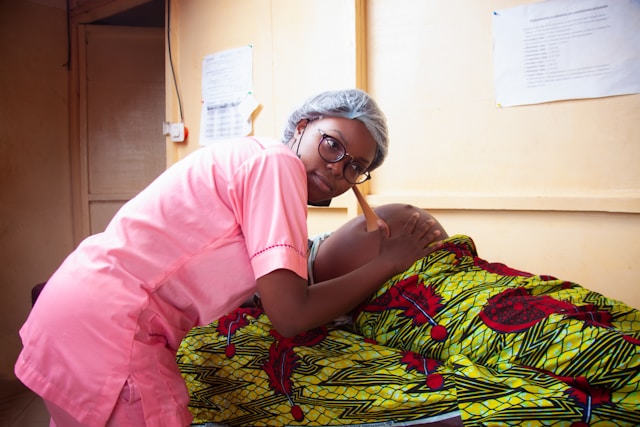As a woman, you understand the significance of hygiene when it comes to childbirth. This is a delicate time when both your health and your unborn child’s health are at stake. With numerous factors to consider, from the sterility of the delivery room to the cleanliness of the maternity ward, it’s essential to be aware of the standards in place to safeguard your health. In the United Kingdom, the National Institute for Health and Care Excellence (NICE) has established comprehensive standards for hospital hygiene in maternity wards. As a woman, it’s important to understand these standards so you know what to expect when you’re expecting.
The Importance of Maternity Hospital Hygiene in the UK
In the UK, the health care staff at maternity units place a high emphasis on hospital hygiene. Given that the process of birth exposes both the mother and the baby to potential pathogens, hygiene is a critical factor in preventing infections and ensuring a safe delivery. A study conducted by the UK’s National Health Service (NHS) and published on Pubmed revealed that inadequate hygiene practices in maternity wards have led to complications such as postnatal infections and neonatal sepsis.
Also read : How Should UK Pregnant Women Adjust Their Skincare Routine to Accommodate Hormonal Changes?
Hygiene isn’t just about cleanliness, though. Maternal health care also entails maintaining a safe and sterile environment that promotes the wellbeing of the mother and child. This includes the provision of clean food, water, and facilities.
Maternity Hospital Hygiene Standards: Cleanliness of Facilities
The cleanliness of the facilities in a maternity ward is a key factor in maintaining a healthy environment. This encompasses everything from the delivery rooms to the bathrooms, the food preparation areas, and the wards themselves.
In parallel : What Are the Essential Features of a Safe and Functional Baby Crib According to UK Safety Guidelines?
The NICE guidelines specify that all surfaces in a maternity ward must be cleaned daily using a detergent and disinfectant. This includes the floors, walls, work surfaces, and any equipment used during delivery.
Rooms should also be well ventilated to prevent the accumulation of harmful airborne bacteria, and waste should be disposed of appropriately to prevent cross-contamination. Furthermore, all facilities, such as bathrooms and food preparation areas, should be adequately maintained to ensure they remain free from harmful bacteria.
Staff Hygiene Practices
Hygiene standards also extend to the staff working in maternity units. All staff should adhere to a rigorous hygiene protocol to ensure the safety of their patients.
This includes washing their hands thoroughly before and after contact with each patient, using alcohol-based hand rubs, and wearing appropriate protective clothing during delivery, such as gloves and aprons. NICE also recommends that all staff receive regular training on good hygiene practices to maintain these standards.
Staff should also practice good food hygiene when preparing meals for patients. This includes washing their hands before handling food, ensuring that all food is cooked and stored at the correct temperatures, and avoiding cross-contamination between raw and cooked foods.
Infection Control Procedures
In addition to cleanliness and staff hygiene, the NICE guidelines also outline specific procedures for controlling infections in maternity wards.
For example, all women admitted to a maternity ward should be screened for infections, and any women found to have an infection should be treated promptly to prevent it from spreading.
If a woman develops an infection during her stay, the ward should implement strict isolation procedures to protect other patients and staff. The ward should also have a robust policy for managing outbreaks of infections, such as MRSA, and all staff should be trained in how to implement this policy effectively.
How You Can Contribute to Maintaining Hygiene Standards
While the hospital staff is responsible for maintaining hygiene standards, you, as a patient, also have a role to play. You can contribute significantly to maintaining a clean and safe environment for yourself and your baby.
You should always wash your hands thoroughly before and after eating, after using the toilet, and after changing your baby’s nappies. If you’re a visitor, you should also wash your hands before and after visiting the ward.
In addition, you should always report any issues, such as unclean facilities or poor food hygiene, to the hospital staff. This will allow them to address the problem promptly and prevent any potential health risks.
In conclusion, maternity hospital hygiene is a critical aspect of ensuring a safe and healthy birth. As a woman, knowing the latest UK standards for maternity hospital hygiene can help to ensure that your needs are met and that you receive the highest level of care.
Comprehensive Understanding of Infection Control Measures in Maternity Units
Infection control in maternity units is another critical aspect of maintaining hygiene standards. According to the NICE guidelines, there should be comprehensive infection control measures in place to ensure patient safety. These measures are designed to control and prevent the spread of infections, such as MRSA, among pregnant women and newborns.
To start with, all women admitted to a maternity unit should be screened for potential infections. This process is crucial as it allows for early detection and prompt treatment of any existing infections, thereby reducing the risk of transmission to the baby or other patients in the ward.
Moreover, if a woman develops an infection during her stay, there should be strict isolation procedures in place. This approach limits the risk of transmission to other patients and health care staff within the unit. It is essential that these isolation procedures are adhered to diligently for the safety of all within the maternity ward.
The NICE guidelines also stipulate that all staff should be trained in infection control procedures. Through frequent and up-to-date training, maternity wards can ensure their staff are equipped with the latest knowledge and techniques for preventing and controlling infections, thereby contributing to a safer environment for both mother and baby.
It’s worth noting that many of these practices and research findings are shared and available on online platforms like Google Scholar and PubMed Google, where you can find articles and PMC free resources on infection control measures in maternity units. These platforms are a useful resource if you wish to learn more about the subject.
Ensuring Mental Health Amidst Hygiene Practices in Maternity Units
While physical hygiene and infection control are paramount, NICE guidelines also recognize the importance of mental health for pregnant women in maternity units. There is a growing body of research, highlighted in countless article PubMed and freely accessible PMC free sources, verifying the link between a clean, hygienic environment and enhanced mental well-being.
Cleanliness, in a direct sense, reduces the risk of infections, thereby reducing stress and anxiety related to health. Furthermore, a clean and orderly environment has been associated with better moods, reduced anxiety, and increased satisfaction, which are vital for the mental health of expecting mothers.
Maternity care providers in the UK are, therefore, required to ensure that the environment in units is not merely physically clean, but is also soothing and comfortable. This includes noise control, ensuring adequate natural light, and maintaining pleasant aesthetics.
Consequently, the practices that contribute to physical hygiene indirectly support the mental health of women in maternity units. As patients, you have every right to expect these standards to be upheld during your stay.
Conclusion
Maternity hospital hygiene is critical in ensuring the safety and well-being of both mother and baby. The latest UK standards, as set out by NICE, provide a comprehensive framework to ensure cleanliness of facilities, rigorous staff hygiene practices, and effective infection control measures. Additionally, these guidelines underscore the importance of mental health, recognizing it as an integral aspect of maternity care.
Understanding these standards empowers you as a patient to ensure that they are being met. Remember, you play a crucial role in maintaining hospital hygiene standards by adhering to simple practices like hand hygiene, and by reporting any issues you may encounter. As a mother-to-be, your vigilance contributes significantly to your own safety, and to the well-being of your newborn.
Whether in high income countries or middle income ones, these standards, practices, and the importance of hygiene in maternity units remain universally applicable. After all, every mother and child deserve a safe and healthy start.











